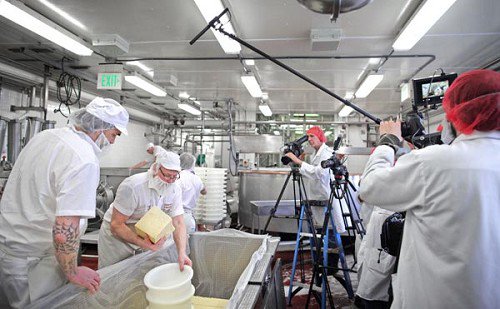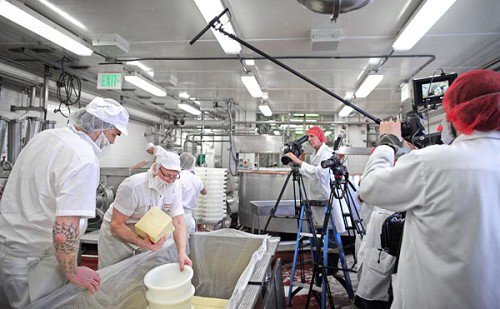MONTICELLO - Bruce Workman of Edelweiss Creamery has hosted Larry the Cable Guy, and now he's being featured on a PBS series on artisan workers called "A Craftsman's Legacy."
Workman is a Master Cheesemaker who started Edelweiss Creamery in Monticello in 2003 in an old cheese factory formerly owned by Albert Deppeler. Workman refurbished the facility to use state-of-the art equipment alongside traditional cheesemaking methods, such as using a copper vat from Switzerland to make Emmenthaler.
Workman was contacted by PBS producer Jen Feterovich about two months ago and jumped at the chance to participate in the series.
"It's been great having them here," Workman said Tuesday. "They've been asking a lot of questions - very inquisitive minds."
Feterovich said PBS is shooting the 13-episode series featuring artisans ranging from clockmakers to chairmakers to blacksmiths from across the country. She and her crew of about eight people have toured the U.S. highlighting craftsmen from Michigan to North Carolina to New York - and the cheese capital of the world, Wisconsin. They were at Edelweiss Tuesday and planned to continuing filming today.
"We wanted to do something on cheese, so of course, we came to Wisconsin," Feterovich said.
Each show will be a 30-minute segment of each individual artisan, with the series set to air in the fall.
Workman said despite his foray on camera before with Larry the Cable Guy, he still isn't used to being on TV.
"I've tried to get as many of my guys in front of the camera as me," he said. "Plus they (PBS crew) take a lot of time to set up, but we're in production so we have to keep moving."
Feterovich said the director, Raisa Churina, had to keep her three photographers and one sound person hopping to keep up with Workman.
"She (Churina) said "I'm trying to make TV but he's making cheese."
Feterovich said she was warned the muggy, humid, cheese production room would probably fog up the lenses of their three cameras Tuesday, but they lucked out and the lenses stayed clear.
But it was difficult, she said, to match the Workman's pace when they met him at about 1 a.m. Tuesday to start production.
Doug Schiete was manning a boom microphone in the humid cheese room and with the clanking of metal and the sloshing of water over cheese, he said getting clear audio was difficult.
"It's a blast. My mic is dripping," Schiete said. "I feel like I'm in a sauna."
As the PBS crew was sweating through their lab coats and hair nets, Workman - bright and chipper - walked the show's host, Eric Gorges, through the forming process of his Gouda cheese.
"All the whey is gone," Gorges said.
"Finally," Workman said.
Then the two men hefted the weights off the plates compressing the Gouda and looked at the 20-foot long brick of cheese.
"That's all one brick, huh?" Gorges said. "What do you think it looks like?"
"I think it looks like a big chunk of cheese," Workman said.
By about 8 a.m. Tuesday, Gorges appeared worn out by the work of producing cheese. He let out a sigh and looked at Workman.
"Yeah, this is hard work, but we're not done yet," Workman said.
Workman is a Master Cheesemaker who started Edelweiss Creamery in Monticello in 2003 in an old cheese factory formerly owned by Albert Deppeler. Workman refurbished the facility to use state-of-the art equipment alongside traditional cheesemaking methods, such as using a copper vat from Switzerland to make Emmenthaler.
Workman was contacted by PBS producer Jen Feterovich about two months ago and jumped at the chance to participate in the series.
"It's been great having them here," Workman said Tuesday. "They've been asking a lot of questions - very inquisitive minds."
Feterovich said PBS is shooting the 13-episode series featuring artisans ranging from clockmakers to chairmakers to blacksmiths from across the country. She and her crew of about eight people have toured the U.S. highlighting craftsmen from Michigan to North Carolina to New York - and the cheese capital of the world, Wisconsin. They were at Edelweiss Tuesday and planned to continuing filming today.
"We wanted to do something on cheese, so of course, we came to Wisconsin," Feterovich said.
Each show will be a 30-minute segment of each individual artisan, with the series set to air in the fall.
Workman said despite his foray on camera before with Larry the Cable Guy, he still isn't used to being on TV.
"I've tried to get as many of my guys in front of the camera as me," he said. "Plus they (PBS crew) take a lot of time to set up, but we're in production so we have to keep moving."
Feterovich said the director, Raisa Churina, had to keep her three photographers and one sound person hopping to keep up with Workman.
"She (Churina) said "I'm trying to make TV but he's making cheese."
Feterovich said she was warned the muggy, humid, cheese production room would probably fog up the lenses of their three cameras Tuesday, but they lucked out and the lenses stayed clear.
But it was difficult, she said, to match the Workman's pace when they met him at about 1 a.m. Tuesday to start production.
Doug Schiete was manning a boom microphone in the humid cheese room and with the clanking of metal and the sloshing of water over cheese, he said getting clear audio was difficult.
"It's a blast. My mic is dripping," Schiete said. "I feel like I'm in a sauna."
As the PBS crew was sweating through their lab coats and hair nets, Workman - bright and chipper - walked the show's host, Eric Gorges, through the forming process of his Gouda cheese.
"All the whey is gone," Gorges said.
"Finally," Workman said.
Then the two men hefted the weights off the plates compressing the Gouda and looked at the 20-foot long brick of cheese.
"That's all one brick, huh?" Gorges said. "What do you think it looks like?"
"I think it looks like a big chunk of cheese," Workman said.
By about 8 a.m. Tuesday, Gorges appeared worn out by the work of producing cheese. He let out a sigh and looked at Workman.
"Yeah, this is hard work, but we're not done yet," Workman said.

